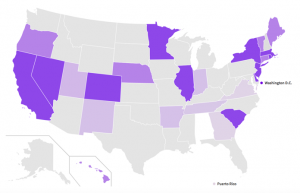“I had blood in my milk from waiting so long…but I had to keep working.”
“I had a male supervisor tell me that I shouldn’t get time to “‘play with myself.’”
“My shirt was soaked. I was in pain. And I tell him, by law I have a right to take care of myself.”
“It just became too much. It affected my home life. It affected my baby. My milk supply dropped. It was spiraling downhill.”
“I can’t believe I was literally sitting on a dirty toilet twice a day making what was food for my kid.”
“I came home that day and told my husband I was not going back and we would figure it out.”
“We’re not asking for anything huge, just privacy and time to express milk for our children while we’re working long hours.”
“I was being told I couldn’t go across the street to feed my baby, who would go hungry without me.”
“It was just such a struggle. Being a nurse and in a prison just felt like a double whammy… In the end [I] ended up smuggling in my manual pump piece by piece.”
Breastfeeding discrimination takes many forms, including:
- denying pumping break requests from employees who are in pain and leaking milk;
- firing them just for asking;
- refusing to provide privacy, leaving workers to pump milk with their breasts exposed to coworkers, clients, and the public, at times in physically unsafe conditions;
- commenting on their “tits,” comparing breastfeeding workers to animals, and mooing at them.
Based on a first-of-its-kind nationwide analysis of breastfeeding legal cases from the last decade, interviews with workers who faced discrimination, and new data on the coverage of laws designed to protect breastfeeding workers, the report documents breastfeeding discrimination’s harsh impact on workers and their families as well as the policies that can help.
Millions of moms don’t have the legal protections they need at work.
Legal rights for breastfeeding workers have exploded over the last decade, but still remain an incomplete patchwork:
- Due to an unintended legal technicality, over 9 million women of childbearing age are not covered by the Break Time for Nursing Mothers law, the federal law that provides break time and private space for milk expression. Excluded workers range from kindergarten teachers to registered nurses to farmworkers.
- Even for employees who are covered, technicalities make the Break Time for Nursing Mothers law practically unenforceable for the average worker. Noncompliance is widespread.
- Title VII of the Civil Rights Act now prohibits employers from firing, harassing, or retaliating against workers for breastfeeding or pumping at work. However it cannot be reliably counted on to provide accommodation rights when workers need them most.
- Many states have filled in the gaps left by federal law. But still, 27.6 million women workers of childbearing age nationwide are left without the basic protections needed by all breastfeeding workers – break time, space, and the right to receive other reasonable accommodations as needed to stay healthy and continue breastfeeding.
Lactation laws work.
Model workplace breastfeeding legislation has seven key components, outlined in the report, to meet the diverse health needs of all breastfeeding workers. The most critical component is a strong enforcement mechanism that holds employers financially responsible for the harm they cause.
Strong workplace lactation laws increase breastfeeding rates, allow nursing women to earn a living for their families, and send the message that workplaces must take women’s needs, as well as men’s, into account.
Are You A Breastfeeding Employee?
Thinking about how to talk to your boss about pumping breaks, private space, or other breastfeeding accommodations? View practical tips created by WorkLife Law and A Better Balance. Select the state where you work.









